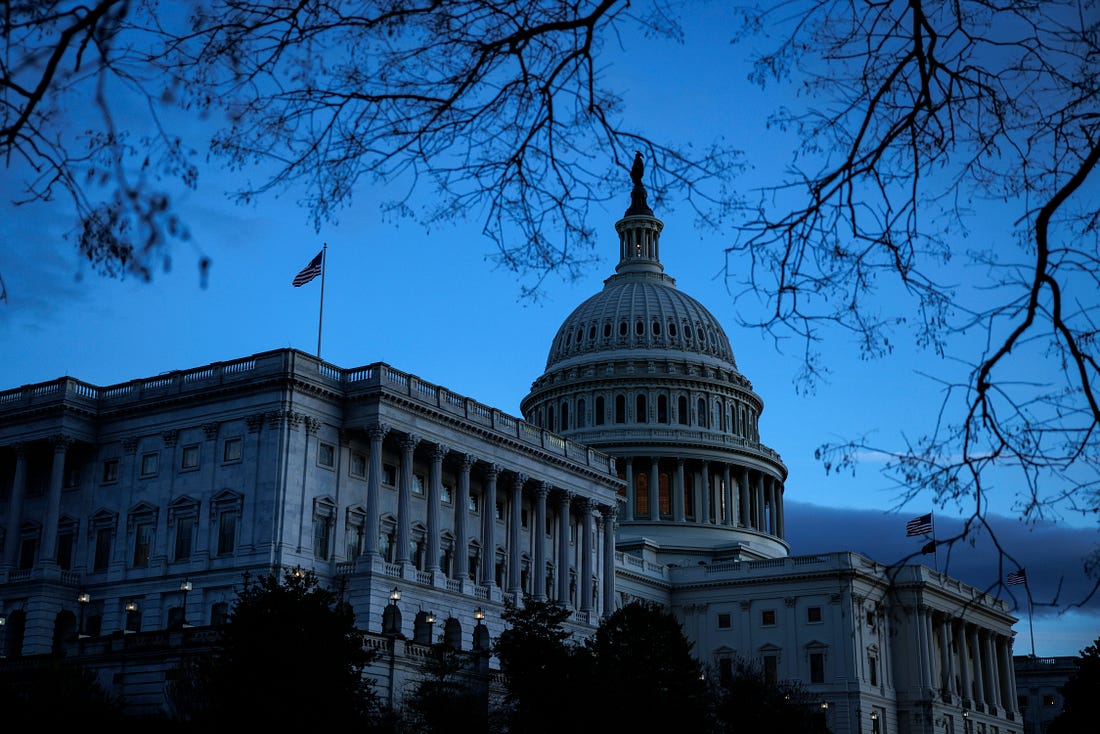|
 |
Four years ago today, the House of Representatives voted to remove Rep. Marjorie Taylor Greene from her assigned committees. How quickly things can change.
Happy Tuesday.
Self-Government Isn’t Guaranteed
by William Kristol
After the last couple of weeks, you deserve a break today.
So let’s take a break this morning from Donald Trump and Elon Musk, from Kash Patel and Tulsi Gabbard, from the Republican party and Conservatism Inc.
Sort of.
Because even if we turn away for a minute from all these less-than-pleasant features of the current moment, we can’t really turn away from the situation we face. Nor can we properly grapple with this hard truth: We Americans are responsible for our situation. Trump and Musk were not imposed on us from abroad. We brought about the crisis we now confront.
And it is a crisis. It’s a crisis that threatens our political and civic well-being. It’s a crisis that threatens the future of the republic.
This was not supposed to happen in the 21st century.
Of course, we 21st-century Americans were aware of Hamilton’s assertion in Federalist No. 1.
It has been frequently remarked that it seems to have been reserved to the people of this country, by their conduct and example, to decide the important question, whether societies of men are really capable or not of establishing good government from reflection and choice, or whether they are forever destined to depend for their political constitutions on accident and force.
But we thought this question had been decided.
After all, the Constitution was ratified, went into effect, and is still in effect. The South’s rebellion against the nation was defeated and slavery was abolished. We and our allies were victorious against fascism in World War II. The civil rights movement brought us closer to the promise of liberty and justice for all. We and our allies prevailed against communism in the Cold War.
Over more than two centuries, self-government often faltered, but it did not fail.
But it could have failed in those past crises. And it clearly could fail now.
Hamilton’s question remains an open one. Are societies of men capable of establishing good government from reflection and choice?
As the Federalist Papers emphasize, simply believing in republican government, simply hoping that all the challenges of self-government will work out, isn’t enough. The Federalist Papers stress the difficulty of successful self-government. Its authors try to show how the features of republican government can be made consistent with the requirements of good government.
They are, to say the least, clear-eyed about the challenge. Republican government has various tendencies that make good government problematic or difficult. Republican government can fail to protect liberties at home. It can fail to be strong enough to deal with threats from abroad.
Self-government based on reflection and choice is neither automatic nor easy.
Reflection is difficult, because, as Madison explains in Federalist No. 37, political science isn’t a perfect science. We often get things wrong in dealing with politics, and so “we must perceive the necessity of moderating still further our expectations and hopes from the efforts of human sagacity.”
And choice is difficult, because, as Hamilton writes in Federalist No. 1, while it would be nice “if our choice should be directed by a judicious estimate of our true interests, unperplexed and unbiased by considerations not connected with the public good,” such an outcome is “more ardently to be wished than seriously to be expected.”
Our political wisdom is limited.
Making the right choices isn’t easy.
So self-government is hard.
But it’s also the case that slavery, fascism, and communism were all defeated by men and women moved, as Madison writes in Federalist No. 39, by “that honorable determination which animates every votary of freedom, to rest all our political experiments on the capacity of mankind for self-government.”
Optimistic complacency about self-government is a mistake. But so is fatalistic despair.
And so, avoiding the Scylla of complacency and the Charybdis of despair, tomorrow we’ll have to get back to dealing with the distasteful characters and the very real dangers that threaten us today.
Quick Hits
CONGRATS, ELON: DOGE’s attempts to dramatically reduce the size of the federal workforce may very well end up succeeding. But so far, it’s having something close to the opposite of its intended effect. Membership in the American Federation of Government Employees (AFGE), the largest federal employee union, skyrocketed in January, according to an internal document obtained by The Bulwark. The union grew by 8,693 members in January 2025, compared to 14,996 net new members in the prior twelve months. AFGE didn’t immediately reply to a request for comment, so it’s not clear if those numbers have changed and when, precisely, in January, it saw the biggest gains. But it seems obvious that a chunk of federal workers—either in anticipation of the Trump administration or in reaction to Musk’s “Fork in the Road” memos—chose to get worker protections rather than flee for the hills.
And, indeed, our old pal Marc Caputo reports this morning that about 20,000 federal workers have taken Musk’s don’t-call-it-a-buyout, accounting for about 1 percent of the federal workforce. That’s well below the 5-10 percent that DOGE was eyeing, though there are a few more days left to go.
One other sign that Musk isn’t yet getting what he wants: A reader passed along an email that the Commerce Department sent to employees yesterday notifying them that they’re now allowed access to the Voluntary Early Retirement Authority program as part of DOGE buyouts—a sweetener to get more people to leave.
JUSTICE HAS A DOLLAR SIGN: First, the criminal justice system failed to deal with the planners and instigators of January 6th. Then, Trump’s pardons and attempts to purge federal prosecutors involved in January 6th cases further suspended justice for those who attacked the Capitol. Now, however, the civil law is restoring at least a modicum of fairness. (We stress the word “modicum” here). The New York Times reports:
The Proud Boys no longer have control over their own name.
Under a ruling by a Washington judge on Monday, the infamous far-right group was stripped of control over the trademark “Proud Boys” and was barred from selling any merchandise with either its name or its symbols without the consent of a Black church in Washington that its members vandalized. In June 2023, the church won a $2.8 million default judgment against the Proud Boys after the organization’s former leader, Enrique Tarrio, and several of his subordinates attacked it in a night of violence after a pro-Trump rally in December 2020.
This ruling applies to Proud Boys chapters anywhere in the United States.
THE BIGGEST DEAL OF THE YEAR . . . 2024: At the last minute, President Trump agreed yesterday not to impose tariffs on Mexico and Canada after phone conversations with the leaders of each country. Mexican President Claudia Sheinbaum and Canadian Prime Minister Just

